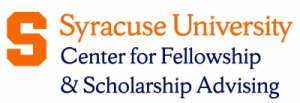How to Get Ahead with Fulbright
The Fulbright student programs provide a wide array of research, study, and teaching opportunities in over 140 countries to recent graduates and graduate students. All of the grants and fellowships through Fulbright allow recipients to spend one academic year pursuing a research or arts project, or teaching English, in a foreign country.
Applicants from across the university submitted their applications to Syracuse University on September 15th, and are now starting their campus interview process to receive endorsement from the university. So what does this process look like?
A two-person team from SU’s Fulbright Campus Committee interviews every applicant. These interviews are necessary to explore academic, and personal qualifications, the feasibility or suitability of a proposed project, motivation and adaptability to a different cultural environment, knowledge of the host country, how an applicant will represent the USA, and, if appropriate, their language qualifications.
Once the SU Fulbright Campus Committee completes the Campus Committee Evaluation form for each candidate, the applications will be submitted to Fulbright on October 10th. Students are able to edit and revise their applications until the submittal date. While the deadline is technically October 11th, it is better to be safe than sorry when it comes to online submissions so SU has a policy of submitting a day early!
We interviewed two faculty members on the Fulbright Campus Committee interview teams to see what advice they have for future applicants. Faculty Fulbright Program Administrator, Susan Wadley says, “A strong Fulbright applicant, whether a graduate student doing doctoral work or an undergraduate hoping to teach English abroad, needs to have a compelling reason for the country and the project. Especially with undergrads, I would ask “why this country?” “What do you know about it?” “What do you hope to offer besides just English lessons?”
Most students who will have successful applications start early on their writing. CFSA provides workshops and one-in-one sessions designed to help applicants produce both the proposal and the personal statement, starting in the spring before applications are due and running through the campus deadline in mid-September. In addition, the office provides email tips about the application process and regular reminders of due dates. Successful applicants take advantage of these opportunities.
Fulbright Campus Committee member Claudia Klaver reiterated Wadley’s advice by confirming that the clearer the student makes the connection to the their scholarship goal, the less the reader has to search to make those connections. She encourages applicants to get involved in tutoring on campus and learning a foreign language before their senior year in order to stand out as an applicant.
The best advice when applying for the Fulbright U.S. Student Program is to start early, use the available campus resources, find your passion early and never be afraid to ask for help.
